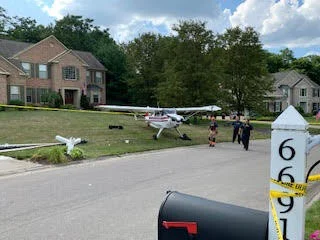Incredulous! The sight before my eyes defied belief. On this steamy hot Saturday afternoon, I sat under a tree in my neighbor’s front yard and shook my head. People milled around in quiet conversation, but I withdrew into my own world and tried to make sense of the dramatic scene, a scene marked off by that ominous yellow tape and surrounded by a sea of flashing red lights.
A plane just crashed into our neighborhood.
Resting askew on the lawn right across the street, a single engine Cessna with a damaged wing stared back at me. My eyes scanned the site and absorbed the evidence: nasty tire marks, splintered mailboxes, and a twisted lamppost.
Where mothers push strollers, where children ride bikes, where couples take walks—where my husband jogs—a twenty-two-year-old pilot made an emergency landing. And, No. One. Was. Hurt. God be praised!
In a crystal clear sky, on a bright sunny July afternoon, at 5,000 feet aloft, this young aviator’s engine died. Died. Caught alone in the cockpit of a small aircraft, he faced an onslaught of decisions. Undoubtedly, his clear head in an extreme crisis averted a tragedy. The awe-inspiring facts stand out:
He did exactly what he was supposed to do.
His response to the crisis was textbook perfect.
His clear head, hours of training, and eight years of experience paid off.
The ability to think and execute in the heat of trauma is a life skill. Dare you and I ask what we do when our engine dies? Do we give up or panic? Or, like the young pilot, do we engage with the facts, engage with the options, engage with a plan, and land the plane?
Still, I gaze out the window of my study, contemplate the serene setting, and shake my head. All is well, but for God and the skill of this young man, the scene could be drastically different.
The plane crash in my neighborhood sheds light on other aspects of life, and thus leaves me with lessons to ponder:
Engage with the facts
Engage with the options
Engage with a plan, and
By the grace of Almighty God, land the plane.









